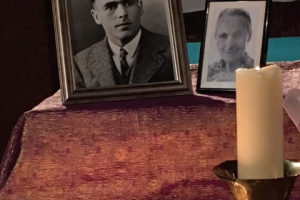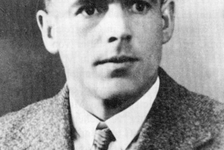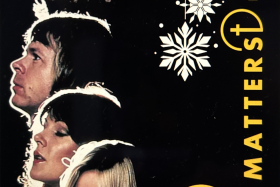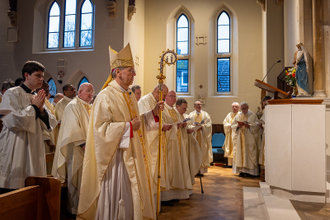Text: meditation on life and death of Blessed Franz Jägerstätter
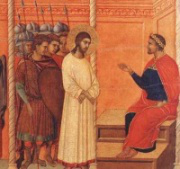
Jesus before Pilate
Fr Patrick Riordan SJ, gave the following meditation at a service to remember the life and death of the martyr Blessed Franz Jägerstätter, held in the Crypt of Westminster Cathedral on Saturday, 9 August - the anniversary of his death.
We read in the Gospel according to Matthew (10 17-39)
Jesus said to his disciples: Beware of men; for they will deliver you up to councils, and flog you in their synagogues, and you will be dragged before governors and kings for my sake, to bear testimony before them and the Gentiles. When they deliver you up, do not be anxious how you are to speak or what you are to say; for what you are to say will be given to you in that hour; for it is not you who speak, but the Spirit of your Father speaking through you.
Franz was obliged to appear before many tribunals and courts, and even his meeting with the Bishop of Linz was a daunting prospect which would have left many other ordinary farmers tongue-tied and inarticulate.
Many have expressed astonishment at Franz’s self assurance and confidence in his own judgment of conscience. Despite the lack of formal schooling, he showed great clarity of thought and precision of analysis.
‘Do not be anxious how you are to speak for it is not you who speak, but the Spirit’
He relied on the Holy Spirit, and trusted in that reality which is part of our Christian faith, that gifts of wisdom and understanding, counsel and fortitude, knowledge and piety are given by God’s Holy Spirit to those who are faithful. He wrote in the last weeks of his life: ‘On what basis do we ask God for the Seven Gifts of the Holy Spirit if we should adhere to blind obedience in any case?’ [243 also 197, 218]
Franz invoked Pope Pius XI’s letter Mit brennender Sorge (1937) which was critical of National Socialism on many counts. This helped him form the judgment on which he relied when answering criticisms and challenges, and even the doubts in his own mind about what he should do: on the duty of Christians to obey the lawful authorities he answered: ‘I do not believe that Christ said that we must obey a state when it commands us to do bad things.’
The bad things were numerous, including the denial of religious freedoms, but the reports from the Eastern Front made absolutely clear the kind of war which was being fought: conquest, domination and theft. ‘If we are fighting against Bolshevism – the excuse of some Catholics, making the war justifiable in their eyes – why are we so concerned about such things as ore, oil, and farmland?’
Jesus said: Brother will deliver up brother to death, and the father his child, and children will rise against parents and have them put to death; and you will be hated by all for my name's sake. But he who endures to the end will be saved.
Brother will deliver up brother: Franz was aware how isolated he was, and how silent his fellow Catholics had become in the face of the Nazi machine: he wrote in his notebook 1942: ‘Have the national socialists now – after more than two years of bringing about the horrible murders of people – adopted a new orientation that would allow and even promote the silence of church officials? Have Church officials reached the decision that it is now permissible for Catholics to belong to a party that opposes the Church? … An ordinary person would surely like to cry out at times.’
Still, while frustrated with the silence of bishops and priests, he expressed compassion for their difficult situation and was not prepared to condemn them.
‘We must turn this judgment over to God. We have neither the right to damn nor even to declare holy. [We cannot judge] whether someone participated freely in this war or was compelled to do so.’
Jesus said: A disciple is not above his teacher, nor a servant above his master; it is enough for the disciple to be like his teacher, and the servant like his master.
Franz wrote in one of his short essays, ‘Even if others treat us unfairly many times or offend us, we should not harbour hatred against them or hold a grudge against them. To what person was more injustice and a greater offence done than to Christ himself? And how did Christ himself respond to this? … Even after all of the great disgrace and pain that people could inflict on a human being, Christ still prayed on the cross for his enemies.’
Jesus said: So have no fear of them; for nothing is covered that will not be revealed, or hidden that will not be known.
Franz wrote in his first notebook: ‘We often live and act as though human beings were our ultimate judge. Many people would live far more Christian lives if they did not have this miserable fear of other human beings.’
Jesus said: What I tell you in the dark, utter in the light; and what you hear whispered, proclaim upon the housetops. And do not fear those who kill the body but cannot kill the soul; rather fear him who can destroy both soul and body in hell.
Although in no doubt that he faced death in consequence of his refusal to serve in the army, Franz showed no fear in the face of death. He meditated on it in the months prior to his execution. He wrote in one of his short essays:
‘For many people death is something fearsome. Although for us Catholics death no longer has its sting, there are still many of us who readily put up with everything only because we do not want to die. Death was something fearsome until Christ opened heaven’s door for us and left for us many means of grace so that we can more easily attain eternal happiness.’ And in the same short essay he proposed this short prayer to be said after receiving communion: ‘My Lord and God, I accept death whenever, wherever, and however it may encounter me according to your most holy decree. I accept it willingly with all its anxieties, pains and sufferings, and I receive it out of your fatherly hands.’
Jesus said: Are not two sparrows sold for a penny? And not one of them will fall to the ground without your Father's will. But even the hairs of your head are all numbered. Fear not, therefore; you are of more value than many sparrows. So every one who acknowledges me before men, I also will acknowledge before my Father who is in heaven; but whoever denies me before men, I also will deny before my Father who is in heaven.
Franz understood his position in terms of Christ’s challenge to his disciples to acknowledge him publicly. He wrote in his second notebook (1942): ‘Christ demands from us also a public acknowledgement of our faith, exactly as the Führer Adolf Hitler demands from his Volk [his people].’
He represented his situation to himself in these dramatic terms: a public declaration was required, and the options as he saw them were ‘either-or’. There could be no compromise. Fro him it was Christ, or Hitler.
This demand for a public commitment, a personal decision, Franz listed among the things he wrote in his notebook that every Christian should know. ‘Each of us stands before the decision whether or not to serve God.’
Franz was very aware that the temptation he faced was to tell a lie, to deny what he knew to be true. In his letter of 8 August, the day before his execution, as he reflected on his earlier encounter with Franziska, who had been brought to visit him in prison, he asked: ‘Do you believe that all would go well for me if I were to tell a lie in order to prolong my life?’
St Thomas More was an earlier martyr who realised the same significance of an oath: both knew that it would be grievously wrong to profess on oath something which each knew to be false (in More’s case, concerning the validity of Henry’s marriage to Catherine, in Franz’s case the entitlement of Hitler to obedience).
This point is worth emphasising. In our 21st century context ‘freedom of conscience’ is often thought of primarily as a fundamental freedom, an exercise of personal choice, autonomy, and deserves respect as such. In our world in which freedom is such an important value, it is not surprising that even the freedom of conscience is considered first of all as a freedom, and we want to ensure that our political and legal systems respect this freedom above all, and many other important freedoms also, which we typically specify in our lists of human rights. Of course this is right and proper, as far as it goes.
But conscience is fundamentally judgment; it is knowledge of what is right and wrong. The one who exercises this judgment is responding to reality as she finds it and discovers it. What she has known, what she knows, is not what she chooses to be the case, and could choose to be different. It is what she finds herself obliged to accept and recognize, admit and acknowledge.
It is astonishing that Franz was so clear on this point, especially given the pressures to which he was subjected. He knew, the oath would be a lie. ‘For what purpose did God create all human beings with intelligence and free will if it is not our place – as many are now saying – to decide whether this war, which Germany is conducting, is just or unjust? For what purpose does someone need to recognize the difference between good and evil?’
‘Many people simply believe that things must be as they are, that they should do what is unjust, and that others have responsibility for this… They also hold that who ever has the mind and the will should be able and willing to obey all regulations. For them, to take the military oath is not to lie. … I am of the mind that it is best that I tell the truth, even if it costs me my life: I cannot obey [the oath] in all of its aspects.’
‘A saint once said that if someone were capable of putting an end to hell by means of telling one small lie, this person should still not tell the lie because he or she would offend God by doing so.’
Franz was aware that the pressure on him was to change his stance, yes, but that required fundamentally that he tell the lie. And this he realised would be a betrayal, a denial of Christ and of his faith.
Jesus said: He who does not take his cross and follow me is not worthy of me. He who finds his life will lose it, and he who loses his life for my sake will find it.
Franz was very aware that his death was modelled on Christ’s death on the Cross. In his 4th notebook writing during his final months in prison of what every Christian should know he included this: ‘Christ suffered on the cross in order to redeem the entire human family. And because every Christian is a member of the mystical body of Christ, God also intends a certain degree of suffering for every Christian. Since there is suffering in the living unity of the mystical Christ, we can even speak of today’s “suffering Christ” or “persecuted Christ”.
In his last letter on the morning of his execution (9.8.43) he wrote to Franziska and included the remark to his mother: ‘How hard it must have be for our dear Lord that he had given his dear mother such great sorrow through his suffering and death! And she suffered everything out of love for us sinners. I thank our Saviour that I could suffer for him and may die for him. I trust in his infinite compassion. I trust that God forgives me everything and will not abandon me in the last hour.’ [129-130] Jägerstätter, and also his wife Franziska throughout her long martyrdom, demonstrated that the words they professed in faith were not just words, but reality.
All quotations are taken from Franz Jägerstätter, Letters and Writings from Prison, edited by Erna Putz, translated with commentary by Robert A Krieg (Maryknoll, New York: Orbis Books, 2009). The numbers refer to the page numbers in this book.
The day also marked the anniversary of the bombing of Nagasaki in 1945. After the service, participants took part in an interfaith procession through Victoria, across the river to the Peace Pagoda, where Buddhist monks lead a peace service, and paper lanterns were released on to the River Thames after sunset. (Further report to follow)



